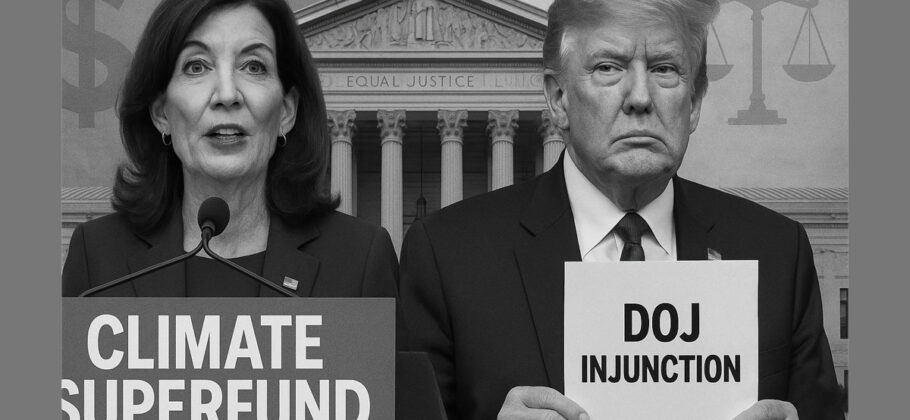President Donald Trump is moving aggressively to stop what he calls a climate money grab by the state of New York. On August 30, the Department of Justice filed for an immediate federal court ruling to block the enforcement of New York’s “Climate Change Superfund Act,” which would force fossil fuel producers and refiners to pay billions into a state-controlled fund.
The DOJ explained that New York’s new law is not about fairness but about punishing companies after the fact. Assistant Attorney General Adam Gustafson said in a press release that the court “must put a stop to New York’s brazen disregard of federal law, the Constitution, and binding precedent, not to mention our Nation’s energy needs.”
Trump himself has described the law as “a climate change extortion law that seeks to retroactively impose billions in fines (erroneously labelled ‘compensatory payments’) on traditional energy producers for their purported past contributions to greenhouse gas emissions.” He added that such policies “weaken our national security and devastate Americans by driving up energy costs for families coast-to-coast.”
What the Climate Change Superfund Act Does
The Climate Change Superfund Act, signed by Governor Kathy Hochul in December 2024, was celebrated by Democrats as “landmark” legislation. It requires fossil fuel companies with business ties to New York to pay into a climate superfund based on their global greenhouse gas emissions between 2000 and 2024. The New York State Department of Environmental Conservation is expected to collect $75 billion over the next 25 years, or about $3 billion annually, from energy producers deemed “responsible parties.”
Democratic Senator Liz Krueger, who sponsored the law, claimed that “New York has fired a shot that will be heard round the world: the companies most responsible for the climate crisis will be held accountable.”
The money, according to state officials, will go to projects like drainage system upgrades, coastal restoration, electrical grid resilience, and healthcare programs that they argue are necessary to adapt to climate change. At least 35 percent of the funds must be directed toward “disadvantaged communities.”
FAM Editor: In case this needs translation, NY is robbing energy producers (meaning energy prices go up for everyone), and giving the money in the quintessential woke manner to the black, brown, gay and criminal communities.
Why Energy Companies Are Targeted
The law singles out fossil fuel companies that emitted more than one billion tons of greenhouse gases during the covered period. The emissions counted are not limited to New York but cover global activity. This means that companies that never directly operated in the state could still be forced to pay.
New York’s approach is fundamentally different from the federal Superfund program under the Comprehensive Environmental Response, Compensation, and Liability Act. While the federal program taxes current production of oil and chemicals to fund cleanups, New York’s law imposes retroactive liability for past, legal activities without requiring the state to prove that a specific company’s emissions caused a specific damage.
The American Petroleum Institute, which represents oil and gas producers, celebrated Trump’s order to block the law. In a statement, the group said, “We welcome President Trump’s action to hold states like New York and California accountable for pursuing unconstitutional efforts that illegally penalize U.S. oil and natural gas producers for delivering the energy American consumers rely on every day.”
Legal Challenges Mounting
Unsurprisingly, the law is already facing multiple lawsuits. Twenty-two states and several industry groups filed suit in February 2025, arguing that the law is unconstitutional. They point out that the Act violates the Supremacy Clause because greenhouse gas emissions are already regulated under the federal Clean Air Act. The plaintiffs also argue that retroactively punishing companies for lawful past activity is a violation of due process.
Industry groups warn that the law could also violate the Commerce Clause by discriminating against economic interests in other states, and they say it may impose “excessive fines” in violation of the Eighth Amendment. Stockholders have raised concerns that the massive new liabilities will drive up costs and ultimately be passed on to consumers in the form of higher energy prices.
The Chamber of Commerce and the American Petroleum Institute also filed separate suits. Their legal filings argue that the Act is “fundamentally unfair” and is nothing more than an attempt to squeeze energy companies for billions of dollars without any real link to damages suffered in New York.
Trump’s Executive Order
The DOJ’s lawsuit is not the only weapon Trump has deployed. In April 2025, Trump issued an executive order directing the Justice Department to stop enforcement of state climate laws like New York’s. The order instructed Attorney General Pam Bondi to “prioritize the identification” and “take all appropriate action to stop the enforcement” of these laws.
The order singled out states such as California, New York, and Vermont. Trump stated that such policies “are fundamentally irreconcilable with my Administration’s objective to unleash American energy” and therefore “should not stand.”
By framing the issue as one of national security and economic survival, Trump has made it clear that he views these state-level climate initiatives as threats to the country’s prosperity and energy independence.
Governor Hochul and other Democrats are defending the law. They claim it simply applies the “polluter pays” principle, making large fossil fuel companies shoulder the costs of the damage they caused. Hochul’s office insisted the law is about fairness, while climate activists say it ensures that wealthy corporations bear responsibility for environmental destruction.
Advocates point to extreme weather events in recent years, arguing that taxpayers should not carry the burden of rebuilding. They say the $75 billion fund is only a “small percentage” of the costs New York will face in the decades ahead.
Critics, however, see the law as little more than legalized extortion. By retroactively punishing companies for lawful activity, New York is sending a message that no business is safe from political targeting. Trump and his DOJ are framing the issue as a fight not just for energy companies but for ordinary Americans who will face higher utility bills and weaker national security if these policies are allowed to stand.
For Trump, blocking New York’s Climate Change Superfund Act is about protecting the American economy and ensuring states cannot invent backdoor taxes under the banner of climate change. The court battle now unfolding will determine whether New York gets its billions or whether the law is struck down as unconstitutional overreach.





